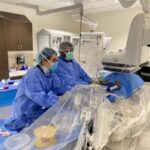 Novice nurses entering acute care practice are often criticized for being "task-oriented." Sometimes, it is a glib comment from an expert nurse who has had their critical thinking skills finely tuned after years or even decades of bedside experience. Other times, it is the recognition that nursing school education has changed, and the opinion that clinical simulation is much less beneficial to the development of clinical skills in a novice nurse than bedside patient care. Perhaps though, being task-oriented is completely developmentally appropriate.
Novice nurses entering acute care practice are often criticized for being "task-oriented." Sometimes, it is a glib comment from an expert nurse who has had their critical thinking skills finely tuned after years or even decades of bedside experience. Other times, it is the recognition that nursing school education has changed, and the opinion that clinical simulation is much less beneficial to the development of clinical skills in a novice nurse than bedside patient care. Perhaps though, being task-oriented is completely developmentally appropriate.
The American health system is increasingly complex, requiring nurses to navigate ever-changing electronic medical records with high acuity patients, all done as quickly as possible to facilitate a safe discharge out of tertiary care. Nurses have to be really good at completing tasks to survive a shift.
In 2012, the Institute of Medicine (IOM) recommended that acute care hospitals have a nurse residency program that is evidence-based with established, measurable outcomes. Four years prior to this recommendation, Holy Cross Hospital was a pioneer in the state of Florida as the first and only hospital in South Florida to adopt a formalized nurse residency program with the University HealthSystem Consortium (now under Vizient™, Inc.) and the American Association of Colleges of Nursing for a successful transition to practice.
While it is generally understood that nurse residency programs are not "skills" programs, Holy Cross Hospital set out to see if embracing the novice nurse and facilitating a "task-oriented" orientation improved the nurse resident’s perception of their preparation for completion of nursing skills in their entry-level position.
Background
For the first 10 years, Holy Cross followed a prepared curriculum with little deviation from the content or order in which it was presented, with poor outcomes related to the nurse resident’s perceptions of skill preparation based on the Casey-Fink Survey skills.
Skills like central line management and chest tubes were not presented until well after the resident had been on their own. Rationale was centered on keeping nurse residents engaged in seminars throughout the year, as work in the simulation lab is perpetually favored.
After assessment of curriculum and bedside orientation, it was determined that front-loading the simulation lab skills often reviewed and demonstrated in much later seminars may establish a better framework for student nurse to novice bedside nurse transition.
Assessment
The 30th Cohort of nurse residents was on boarded as the trial group. Six additional hours were given for the following skills: blood transfusion simulation, Kangaroo/PCA/Plum Pump review, central line management, indwelling urinary catheters, enteral feeding tubes, ostomy care, CBI management, tracheostomy and drain care.
The change in the nurse resident’s perceptions of skills preparedness was dramatic. The trial group, Cohort 30, demonstrated being above the national benchmark in 18 out of the 21 measured Casey-Fink Survey skills. Comparatively, Cohort 28 demonstrated being above the national benchmark in 13 skills out of 21, and Cohort 29 demonstrated only 8 skills out of the 21.
Impact on the Future
Further results as each cohort progresses are still needed and the effect on retention rates is to be determined. With positive initial results, there has been continued investment from nursing leadership to give residents six hours of skills. The use of Vizient’s Survey database is credited to being the most effective tool in developing a business case for change to curriculum and increase in nurse residency investment.
The improvement in perception of skills preparation has been replicated since the pilot cohort time and time again. By shifting the program focus slightly, nurse residents are better able to master the tasks and skills needed for shift-to-shift survival. With their increased perceptions of their skills preparation, new nurses can more confidently tackle nursing care beyond the "tasks."


























